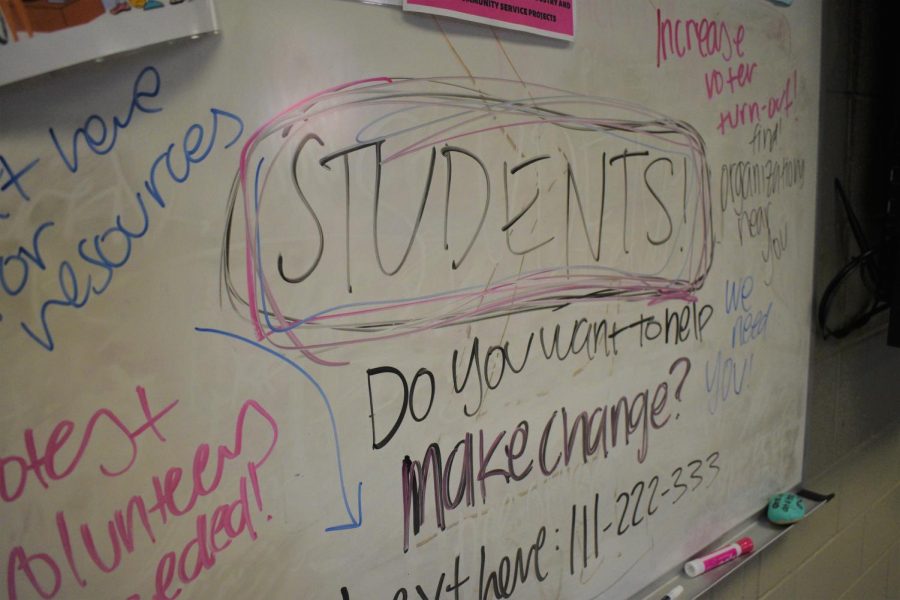The positive prominence of politically active teenagers
In this unique age of social media, political advocacy among teenagers experiences a staggering uptake. Despite age disparities that may come across as unfit for teens who involve themselves in this field, the youth of today prove that when it comes to speaking on important issues, age does not stand as a barrier. In a field dominated by a once-phoneless generation, the youth of today show that they too own the ability to create change.
March 1, 2023
2020 served as a defining year in the global consciousness. Through the isolation so graciously provided by the Covid-19 pandemic, people began to establish a sense of self that formerly proved difficult to find in the hustle and bustle of daily life. In the midst of an era that forced self-discovery, teenagers found empowerment through political activism and advocacy. Numerous world events of the year served as the catalyst that sprung teens into the world of politics, most specifically in the United States. Through the height of the Black Lives Matter movement and in the aftermath of the 2020 presidential election, American teenagers turned to social media to spread their political epiphanies and raise awareness of issues facing their communities and country. While the incline of politically active teenagers may result in age-fueled hostility from older generations, the uptake of teenagers within the sphere of diplomacy proves to benefit the future of the States.
Social networking sites grant teenagers immediate entry to information, resources and allyship in the face of pressing social or political areas of conflict. Through hashtags or threads on sites such as Twitter or Instagram, the accessibility of updates or news occurring in towns and cities miles away now lies available at fingertips nationwide. The popular video-sharing app, TikTok, encourages the mass spreading of content thanks to its algorithmic method of delivering videos that users frequent. When a plethora of similar ideas land on an individual’s For You page, they receive exposure to different accounts that post about the same videos akin to what users like to watch. In the case of political content, a TikTok algorithm of a politically-intrigued teenager could include videos from accounts promoting different organizations, discussing federal matters or running statistics from recent elections.
This sense of political proactivity among young people continues to spread feverishly in recent years. Building up to the 2020 presidential election, the age demographic of 14 to 17-year-olds —while unable to vote— still participated in advocacy online. According to the Center for Information & Research on Civic Learning and Engagement (CIRCLE), 29% of teens utilized personal testimonies and writings to speak out about politics, 27% turned to social media to produce graphics and 34% percent shared their own experiences concerning politics. Several teen-led organizations appeared across the States, which tackle several social justice issues and causes. Examples of these include the non-partisan Austin Teen Coalition in Texas, with the goal to increase voter turnout in the city by supplying knowledge to citizens on policies; the organization Teens 4 Change, which aims to educate young people on progressiveness within politics; and Team Enough, whose mission revolves around teaching young people about how they too can aid in the fight against gun violence.
“Ever since the pandemic started, I’ve noticed more and more of my classmates and social media users commenting and debating on political topics such as vaccines, the recent presidencies and the future of politics. At school the debates are typically lighthearted but online they get heated even among those who can’t vote yet,” sophomore Gabby Johnson said.
Even though teenagers have proven their capability and capacity to discuss matters pertaining to pressing political problems, a barrier still exists between youth advocacy and grown-up understanding. A perceived imbalance of maturity between adults and teens comes into play due to the disparity in responsibility between the two demographics. Where the adults own the democratic privilege of casting an election ballot during every presidential election and midterm, the teenagers stay at home, patiently waiting for changes they do not retain the ability to alter.
“… [Adults seeing the validity with teenagers in politics] definitely depends on the adult. Some people, even politicians, are starting to realize the value of youth in their movements, especially teenagers who are close to or at voting age. Teenagers have been active in campaigns, protests, petitions and other political processes causing real change more now than probably ever before, so the validity of teenagers in politics is getting harder to ignore. However, it is also true that some adults are dismissive of teenagers, saying that their involvement is somehow less important just because they aren’t as experienced,” magnet sophomore Gabi Haigh said.
Despite the disproportion in duties presented to teens and adults on the political scale, the teenagers of America still own the ability to influence. With tools such as social media or protesting, young people already stir the pot on important issues. A youthful perspective on political issues proves crucial, as any current problems that fall on the world today will rest on the shoulders of those currently under 18. Instead of negating the ideas of teens due to their absence in choosing policies or policy-makers, said thoughts must receive validity, open-mindedness and a deserved amount of respect.
While politics garners a reputation of divisiveness, when used appropriately, it provides a sense of unity and engenders hope in all who participate. The teens of today should experience that feeling right alongside adults, whether they own the faculties to vote or not. In order for politics in America to work for every citizen all citizens must feel included in the conversation— regardless of their age.







